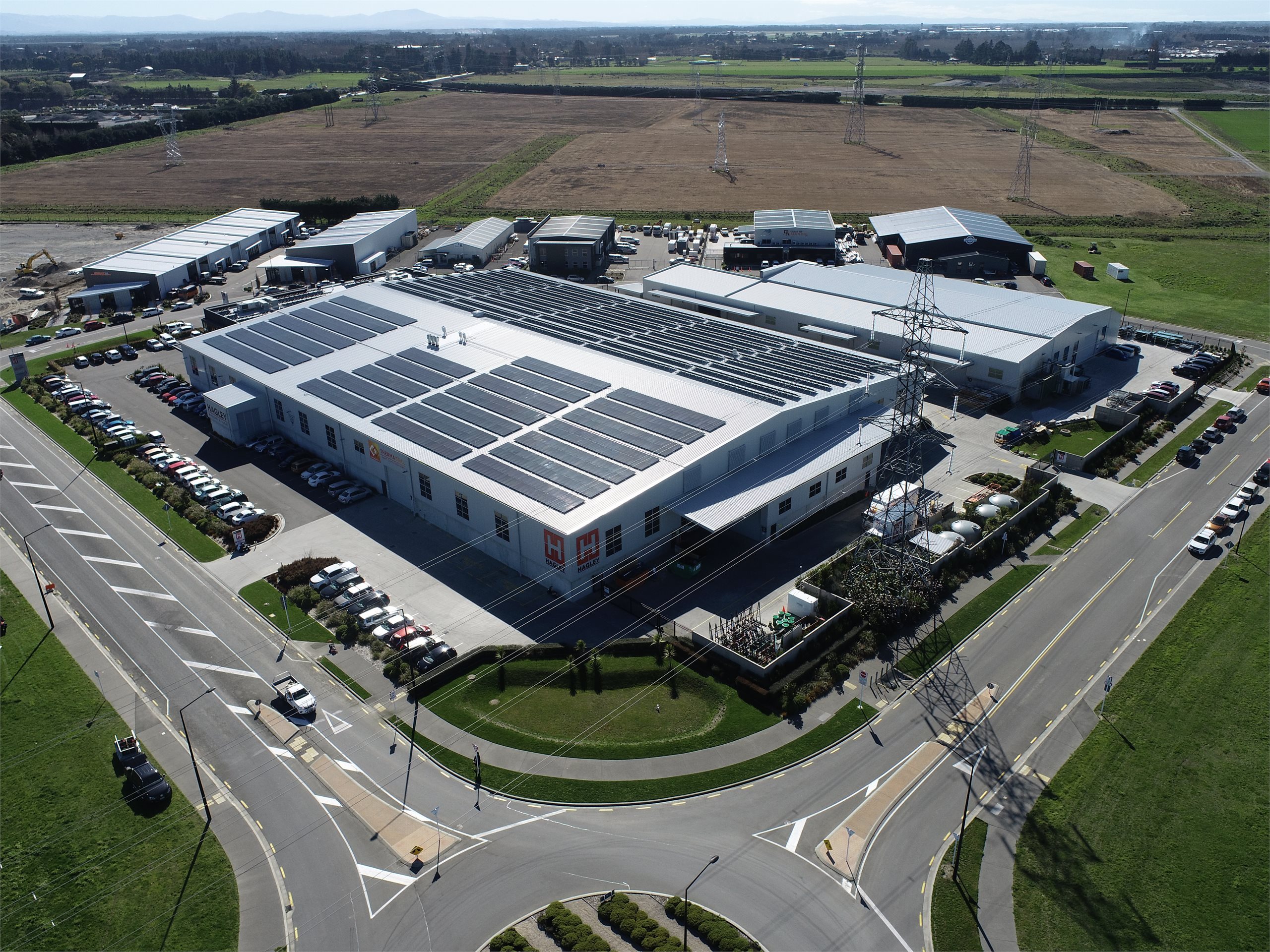
Hagley Group takes its corporate responsiblity around sustainability seriously and has invested heavily in this area. We take many actions to support our aim of low impact on our environment.
Our aim is to supply energy efficient windows, doors and structural glazing to the residential and commercial construction industry.
Below are the details of the investments made, facilities installed and the activities that are in place which are part of our standard operating practices.
Electricity generation / solar panels
Our focus is on reducing our energy consumption. In 2019, we started installing solar panels on the roof of our site at Waterloo Business Park.
The panels positioning has been designed to utilise a maximum time of available sunlight. Currently we have nearly 3,000 panels making us one of the largest solar installations operating in the South Island.
Our solar gains allows us to run our high-energy consuming glass furnace and glass processing ovens at low cost. The surplus renewable electricity generated goes a long way to meeting our carbon footprint. Our consumption data is displayed at reception and is often talked of favourably by clients and visitors alike.
Water
We all know water is a precious resource. We are playing our part to ensure our operating practices use minimal water. Our two strategies in place are:
Capturing and using rainwater
Our buildings have a large catchment area. Rather than have the water go to the stormwater system leading to increased loadings, our roof areas collect and pipe rainwater to our 100,000 litre storage tanks. This water is then used in both our daily operating practices and to irrigate our award-winning lawns and gardens.
Recycling of process water
To ensure a quality glass unit is made, free of grease and dust, the glass requires washing with water. We have invested in wash plants through our facility which include elaborate filtration systems. This enables wash water can be continuously filtered and reused.
Vehicles
We are conscious about the impact our fleet has on the environment, which is why when it was time to upgrade some of our fleet, we chose to invest in several Toyota Rav4 hybrid vehicles.
This is yet another signal of our commitment to employ sustainable business practices and minimise our pollution levels.
Plus, our team get an added benefit of feeling good about driving them!
Recycling & Waste
We aim to put less in the landfill and instead promote our reduce, reuse, and recycle philosophies.
Packaging & materials
Each year, we produce over 1,100 tonnes of glass waste which would ordinarily have ended up in landfill. We have partnered with 5R Solutions, who repurpose our glass waste into various products such as glass wool insulation, bottle manufacturing, swimming pool filtration media and sandblasting media. This includes up to 95% of parts of any broken or damaged laminate and double-glazed windows units.
We recycle most of our packaging cardboard and plastics. All wooden packaging is either returned to suppliers or our team break this down, take it home and repurpose it to heat their own homes.
Steel frames and strapping from delivery of glass packs are collected by Annex Road Metals, a metal recovery trader. Aluminium offcuts are collected by a recycling company and processed into value-added products.
We’ve also been able to find a repurpose solution for treated timber off-cuts which are challenging to recycle because of the chemical treatment. We’ve partnered with another Christchurch based construction company who collect these and use them for fuel for drying timber.
Used solvents and solvent soaked rags
Solvents used in the glass printing process are collected and re-refined by a chemical processing contractor for use as a lower grade product in other markets. The cloths used for cleaning of glass and aluminium joinery during production are kept separate from general waste and are taken for disposal in a specialised facility.
Lunchroom waste
We provide bins for the recycling of plastics, paper, and glass so they can go to council recycling, separate from general waste.
Upcycling
We look for opportunities to donate to the community or make available commercially, wastes from the consumables or wastes of products. An example of this is repurposing of sturdy plastic spools that product comes on – we now see them being used as tables and seating at preschools, in playgrounds and homes. If our team hadn’t taken the time to repurpose these, large quantities of these would have ended up in landfill.
Some very talented people in our community have turned these into some great products.




